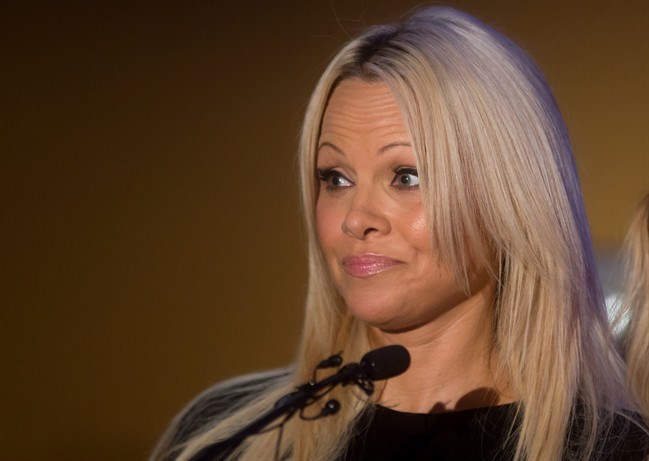Scores of salmon farms around Vancouver Island will be given six-year licences instead of one-year deals, sparking alarm among wild-salmon advocates. The move comes as environmentalists push to investigate what they see as the dangers of aquaculture.
Licence extensions were approved by the federal government in February 2015 and took effect July 1 through the Department of Fisheries and Oceans, which took over licensing from the province in 2010.
Until now, fish-farm operators have had to plan their finances year by year, even though their fish take two years to raise, said Jeremy Dunn, executive director of the B.C. Salmon Farmers Association. Even with the increased tenure, the DFO reserves the right to change conditions if necessary to ensure wild salmon conservation, he said.
Meanwhile, the Sea Shepherd Conservation Society has teamed with aquaculture critic and biologist Alexandra Morton, environmentalist David Suzuki and actor Pamela Anderson to investigate the impact of B.C.’s salmon farms, most of which are off the east coast of Vancouver Island.
“As a scientist, it makes no sense to grow animals in open nets where you use the ocean as a shithouse,” Suzuki told reporters at a news conference Monday. “Not only are you pooping in the ocean, but you’re also sharing the growth of sea lice and infections that explode in the enclosures.”
As part of Operation Virus Hunter, Morton and other scientists plan to travel for several weeks aboard a Sea Shepherd ketch tracing Fraser River sockeye migration routes from Vancouver to the north end of the Island, and stopping at some salmon farms to check for disease in a “non-aggressive” manner.
They also plan to check other wildlife near aquaculture operations, search for toxic algae blooms and look at the waste that flows out of the marine net pens.
The Pacific Salmon Commission predicted Friday that this year’s sockeye run might generate just 2.27 million fish, compared to the 50-year average of 3.9 million. That’s low for a commercial or recreational fishery on the Fraser River.
Cheam First Nation Chief Ernie Crey said recent wild salmon declines constitute “a threat to our existence and we hold salmon farms as one of the culprits.”
But Dunn said salmon farmers have “tremendous support” from First Nations, with 78 per cent of farmed B.C. salmon raised under 20 separate economic and social protocol agreements with First Nations.
All B.C. salmon farms have third-party certification from independent environmental bodies that audit their operations, he said, adding salmon aquaculture has the second highest agricultural value in B.C. next to dairy products and creates 5,000 jobs.
Dunn said he is concerned about wild salmon, but salmon farmers should not be blamed for environmental problems rooted in climate change — such as last summer’s extreme dryness or the massive “blob” of overly warm Pacific water.
The 2009 federal Cohen Commission made 73 recommendations to protect wild salmon, tabled in 2012.
But the Watershed Watch Salmon Society, a Vancouver-based conservation group, says a plethora of lapsed deadlines translates to almost total lack of completion. “For example, there is no evidence DFO has taken any action on recommendation #3, which calls for the removal of the DFO mandate to promote salmon farming as an industry and its products,” its website states.
Salmon farmers are awaiting comment on Cohen’s recommendations by the federal government, Dunn said.
In May 2015, Federal Court Justice Donald Rennie struck down part of the rules governing the transfer of fish between aquaculture operations — a win for Morton, who brought the action. The case hinged on whether salmon-farm operators could move diseased fish into netted pens in the Broughton Archipelago, off the northeast coast of the Island. The court gave Fisheries and Oceans four months to tighten its regulations to prevent infections being transferred from farms to the open ocean.
Fish farms spread disease that destroys “the natural habitat of our wild salmon — the coho, the sockeye and the chinook,” said Sea Shepherd founder Paul Watson in a statement. “These exotic Atlantic salmon simply do not belong in these waters.”
Dunn responded that “the reality is that Atlantic salmon are a farm animal much like chickens, pigs and cows, that are also not native to Canada.”
Fisheries and Oceans issues aquaculture licences following a scientific review of potential impacts on wild fisheries, while the province issues licences of occupation for Crown land.
According to a joint B.C.-federal report, salmon products generated a wholesale value of $772 million in 2013. Farmed salmon products accounted for 77 per cent of that, and wild salmon the remaining 23 per cent.
There are 109 licensed salmon farms in B.C., most on the east side of Vancouver Island and Clayoquot Sound, Nootka Sound and Quatsino, Dunn said. Of the seven major operators, Marine Harvest, Cermaq and Grieg Seafood holdings produce about 90 per cent of all farmed fish, he said.
— With files from the Vancouver Sun



